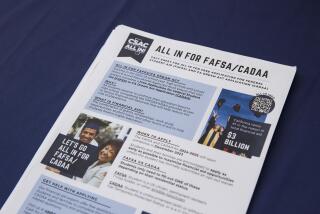Help Promised on College Aid Forms
- Share via
A citywide effort is being launched to counsel high school seniors and their parents on how to fill out college financial forms, a challenging task believed to keep some low-income and immigrant students from continuing their educations.
Mayor James K. Hahn will announce the initiative today; it includes plans to recruit hundreds of volunteers from local accounting firms, banks and other businesses, along with college financial aid specialists.
The central event in the program is scheduled for Feb. 1-2, when the volunteers are to spend the weekend providing counseling at about 50 high schools in the L.A. Unified district.
During the rest of February, city employees trained to provide help with financial aid forms will be available at community centers throughout Los Angeles for people who can’t attend the weekend program or who need follow-up assistance.
In addition, a College and Career Convention will be held Nov. 7-9 at the Los Angeles Convention Center.
The initiative is intended to help students and their parents accurately complete the detailed college aid forms known as FAFSA. Many higher education experts say that chore can be so difficult for families that aren’t financially savvy that they make errors that prevent their children from qualifying for grants and scholarships.
Thomas J. Kane, a professor of policy studies and economics at UCLA who develped the idea for the program, cited the difficulties of low-income students seeking to become the first in their families to attend college. “It may be exactly the people whose college decisions are most likely to be affected by the availability of financial aid who would have the most difficulty filling out the forms,” he said.
Kane said the forms for FAFSA -- which stands for Free Application for Federal Student Aid -- are more complicated than tax forms because “there are all sorts of additional questions about family composition and students’ own income, students’ own assets and parents’ assets that aren’t required on the federal tax form.”
He added that there is a “big industry for helping fill out tax forms” but much less help for students and families trying to fund their education.
According to a study released in June by a federal advisory group, 52% of qualified students from families with incomes below $25,000 advance to four-year colleges. The percentage was 84% among qualified students from families with incomes exceeding $75,000.
The “Free Cash for College Weekend” is intended to familiarize high school seniors and their parents with the variety of available college scholarships and loans.
Joy Y. Chen, the deputy mayor spearheading the program for Hahn, said students from affluent families sometimes rely on private counselors to provide information on colleges and advice on paying for school.
“If you don’t have a private college counselor at your beck and call, here we’re mobilizing the community to provide some of that service for you,” she said.
In part, the “Free Cash” weekend is timed to meet the March 2 deadline to apply for the state’s Cal Grant aid program. That program, which generally focuses on students on the bottom half of the income scale, was expanded dramatically in 2000 to make it more widely available.
Chen, the deputy mayor in charge of work force development, said the city initiative could encourage more students to apply for Cal Grant funds. State officials have been disappointed with the low level of applications for the grants since the program was expanded two years ago to include every state high school graduate with at least a C average who can show financial need.
More to Read
Sign up for Essential California
The most important California stories and recommendations in your inbox every morning.
You may occasionally receive promotional content from the Los Angeles Times.













